Hello lovelies!
With the New Year, you probably have new beauty and skincare resolutions. You may have defined your new beauty routine…or even decided to use beauty products with cleaner ingredients.
And you’ll be right in the new beauty trends! Lastly, many women have embraced the path of DIY skincare to counteract the effects of undesirable cosmetic ingredients. The cosmetics industry tries to communicate more about the ingredients of the products, and eradicate the dangerous ones. But there is still progress to make in this matter.
If you’re like me, you don’t necessarily understand all this scientific nomenklatura and you’re scared. Hence the increasing the sucess of DIY skincare. Even if DIY skincare appears beneficial for most of us, it is not without risks for us. In this article, I’ll introduce the benefits and risks of DIY skincare. Let’s get started!
Disclaimer: This post contains affiliate links to help me support this blog. I may earn a commission whenever you click on the links and purchase the products, with no additional cost to you. Thanks in advance for your support!
The benefits of DIY skincare
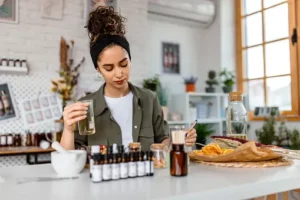
Nowadays, many women want to make their beauty products themselves. From deodorants to makeup products, you have more and more books and workshops helping you to shape your cosmetic products. Actually, many women discovered their inner chemist while embracing this activity! Here are some benefits of DIY skincare.
DIY Skincare: Take control of your beauty products
Tired of too many scientific names on your beauty cream? Then, DIY skincare is just what you need! By using all naturel ingredients like oils, fruits, and essential oils, you take control of what you put on your skin and your hair.
Moreover, DIY enables you to create your own personalized beauty routine. Indeed, many women complain that mainstream cosmetic products are not effective on them.
Thus, you may create products adapted to your skin and hair needs. For instance, you may blend oils adapted to your skin as a body lotion. Or exclude some products you’re allergic to. DIY skincare offers many possibilities. It’s up to you to explore them!
Be kind to the environment with DIY Skincare
Did you know that plastic accounts for over 100 billion units of packaging produced each year by the cosmetics industry? This is huge! It’s even more alarming when you think that only 9% of plastic waste is recycled, according to a report published by the OECD.
Therefore, embracing DIY skincare is good to save our planet. However, it doesn’t mean that shops where you’ll shop your DIY ingredients have zero-waste solutions. But they’re still better than the classic cosmetics, though they make some recycling efforts.
Keeping traditions alive with DIY Skincare
Personally, I enjoy DIY skincare recipes because I can make what my mother and my aunts taught me s a child. Actually, it’s very refreshing to see that I might pass some natural beauty secrets to my daughters, if God blesses me in that department! Thus, if you have children, you may plan specific workshops with them. And I can guarantee you that preparing DIY recipes is fun!
The risks of DIY skincare
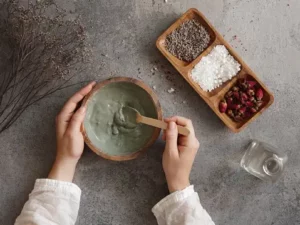
Though DIY skincare offers several benefits for you, it’s not without risks. If you enjoy DIY recipes on beauty blogs like mine, you’ll notice that many of them are harmless. However, this doesn’t mean that DIY skincare is without risks! Let’s explore them now, shall we?
Beware of essential oils!
Indeed, natural ingredients are not always innocuous. For example, you must use essential oils very carefully. This is especially true if you have allergies, or if you’re pregnant or breastfeeding.
Moreover, please keep in mind that some mixtures can create undesirable reactions, such as rashes. Actually, chemistry does its work everywhere, including in natural products!
Consequently, you must pay attention to respect the correct dosage. Also, check the pH of the finished products when recommended, following recipes designed by experts or very knowledgeable people. Don’t forget that commercial cosmetics also undergo extensive laboratory testing to make sure they’re healthy. And this is something you can’t do at home!
Conservation can be an issue, too
DIY recipes also have another problem: their shelf life. Have you noticed the presence of stabilizers and preservatives in mainstream cosmetics, with scientific names and code numbers you don’t understand? Well, it is on purpose!
Indeed, these ingredients are there to increase the shelf life of your products. Thus, they help you use your cosmetics in the long run without problems.
However, it depends on the recipe you use. if you made a “minute” products that you’ll use right aways, then the problem doesn’t really arise.
But if you prepared products to be preserved, then you’ll need to be vigilant on certain points. Don’t just put your DIY preparation in the fridge willy-nilly, hoping that it will still be effective.
Now, let me share one of my experiences with DIY skincare with you. I was in my 20s, and I heard about caramel treatment. Don’t worry, I intend to introduce caramel treatment in a future post, so stay tuned! Well, I made the recipe and apply it on my hair. Then, I stored the remaining mask in the fridge. But I didn’t put any preservative in it.
And for my own misfortune, I forgot that it was in the fridge! So, when I finally remembered that I had some caramel treatment in my fridge, I thought I could still use. Unfortunately, my DIY caramel treatment had rotted and was full of mould! This experience taught me about the preservation of my DIY recipes very early.
Good practices for preservation
Therefore, here are some good practices you can apply to preserve your DIY preparations in the best conditions:
- use of disinfected bottles, tinted if necessary to avoid contact with the air
- addition of preservatives to your DIY preparations in appropriate doses: vitamin E or grapefruit seed extract
- prefer a cool storage for certain moisturizing creams, oils and certain active ingredients
A certain expertise is needed
I’ve noticed this issue for some DIY recipes I’ve tested. Indeed, you may miss some ingredients to add in your DIY recipes. In particular, this is true for ancient recipes, or those containing rare essential oils you won’t find easily.
In that case, you may be tempted to replace the ingredient with another that you know. However, I don’t recommend this practice, especially if you’re a beginner and if you don’t have any expertise in natural ingredient. Indeed, you may have an adverse result on your skin and your hair. And you don’t need that!
Therefore, I’d advise you stay with simple DIY recipes in the first place, using products you can find in your kitchen. Those natural ingredients include vegetable oils, fruits like avocados, eggs, yoghurt, flour, or honey. Then, expand your DIY practice to other natural ingredients when you’re absolutely comfortable.
My recommendations about DIY skincare

If you want to start preparing your DIY cosmetics, here are some resources you’ll need:
The Complete Book of Essential Oils and Aromatherapy by Valerie Ann Worwood
This book will show you the multiple benefits of essential oils, as well as multiple recipes for your beauty, your health, and even your home.
The Green Beauty Guide by Julie Gabriel
In this book, you’ll get more information about the effects of synthetic products on your skin. Also, you’ll get several recipes for organic makeup, moisturizers, and hair care.
The Holistic Beauty Book by Star Khechara
You’ll get natural recipes for your skin, hair, and even for baths!
Don’t Go Shopping For Hair Care Products Without Me by Paula Begoun
If you want to learn more about the ingredients your favorite beauty products have, then read this book!
Conclusion: what are the benefits and risks of DIY skincare?
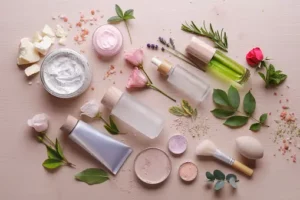
By enabling you to take control of your cosmetics, DIY skincare has incredible benefits for you. Indeed, you’ll use natural products that you know; and you won’t be worried anymore about harming the planet. However, DIY skincare has several risks involving the nature of natural ingredients themselves, and the preservation of your preparations.
Therefore, you may carefully assess your motivation before going for DIY skincare in your beauty routine. However, if you’re a woman in a hurry, don’t worry! You can always rely on organic cosmetics or learn how to read the labels!
Well, that’s it for today! What do you think about the benefits and risks of DIY skincare? Feel free to share your thoughts in the comments below!
Take care, lovelies!
Want more content from me? Join my newsletter today and received the latest updates of my website. Also, you’ll receive a wonderful gift in your email!

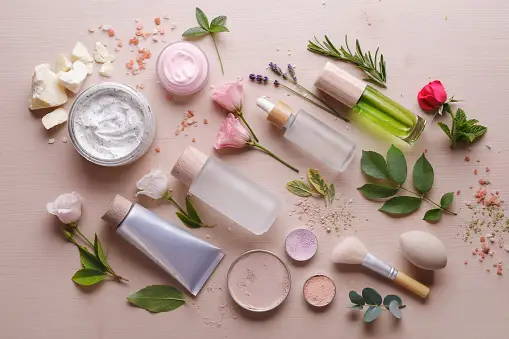
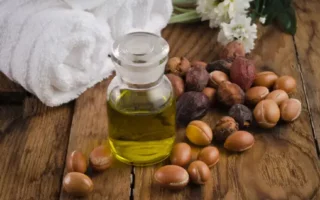
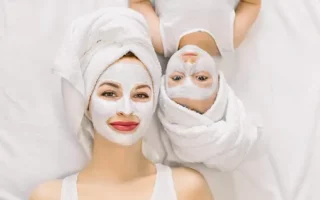
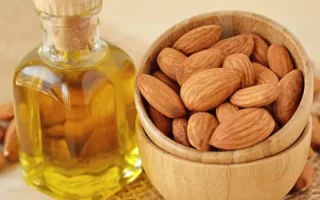
Hey, great article on the risks and benefits of DIY skincare. It’s important no matter what time of year, but it seem like especially now in the winter (for those of us in the northern half of the globe) it is vital to take care of our body’s largest organ. It’s easier for skin to dry out, plus being skimping on our self care routine is more tempting now when it’s dark and cold.
A friend’s Italian grandmother used to say that good soap and good olive oil are the keys to healthy skin (the olive oil is healthy to eat, and you can apply it directly to the body). She may have been on to something – she lived well into her 90s, and never looked a day over 50.
Thanks for your comment !
Really insightful article! I’ve been exploring DIY skincare for a while and this brought up some great points. However, I’m curious about the balance between natural ingredients and effectiveness. How can we ensure that homemade skincare products are not only safe but also effective? Are there any specific ingredients or combinations that are particularly beneficial for common skin concerns like dryness or acne?
Thanks for your comment ! Don’t worry I’ll publish DIY recipes very soon si stay tuned !
This article wonderfully encapsulates the allure and caution necessary in the realm of DIY skincare. I resonate particularly with the emphasis on ingredient control and environmental consciousness, two aspects often sidelined in commercial skincare narratives. However, the risks highlighted, especially regarding ingredient safety and product preservation, are pivotal.
It strikes me that while DIY skincare is a journey back to roots and simplicity, it paradoxically demands sophisticated knowledge and meticulous attention to detail. Navigating the fine line between using time-honored natural ingredients and ensuring these formulations are both safe and effective, especially for specific skin concerns like sensitivity or acne-prone skin, presents an intriguing challenge that speaks to the heart of modern skincare practices.
Thanks for your comment!
The article provides a balanced view of the benefits and risks associated with DIY skincare. On the positive side, the author emphasizes the control it gives individuals over the ingredients they apply to their skin, promoting the use of natural products that align with personal preferences and needs. The environmental aspect is also highlighted, shedding light on the excessive packaging waste generated by the cosmetics industry. The piece encourages readers to adopt DIY skincare as a way to contribute to environmental sustainability. However, the risks are not overlooked. The cautionary notes about essential oils, potential adverse reactions, and the importance of preservation are crucial aspects discussed. The personal anecdote about a DIY product going bad due to inadequate preservation adds a practical touch to the potential pitfalls. The recommendations for resources, including books on essential oils and natural beauty recipes, enhance the article’s value for those considering DIY skincare. How can individuals strike a balance between enjoying the benefits of DIY skincare and mitigating the associated risks, especially regarding ingredient expertise and proper preservation?
Hello, thanks for your comment! As for your question, I just have a word: self-education!
Hi
A very comprehensive article. Very helpful to those interested in DIY cosmetics. It specifies how to go about making these cosmetics. You have also taken us through the risks associate with DIY skincare products. Ingredients making these skincare product are chemicals. Chemicals are in their nature dangerous in a sense that just small change in their environment may change how they behave. Are you not scared that these are possibilities and if you not trained chemist this may pose a serious risk.
Thank you for sharing
You’re welcome! Thanks for your comment!
Skin is the ambassador of your health inside out.
You can inherit good skin as well. Some people inherently have poor skin texture.
Regardless of how your skin is, you have to take care of it to keep it healthy and thus nourish it.
It is not easy to pick a skincare product from the market to apply on the skin and there is a learning curve of knowing what the fine print of ingredient it carries with it. There are preservatives which are not regulated by the healthcare industry.
Knowledge of chemistry of what is inherently hazardous to skin and health is necessary. Skin can absorb the ingredients you put on it and can show good and bad responses from the inside out.
So you like to synthesize your care product. It involves some learning as well. There are books and procedures available to gain knowledge in this field.
Taking care of the climate and the Mother Earth around you is our collective responsibility. Designing skin care products preferably needs zero discard of earth unfriendly products,
Prefer DIY? It may be best if you find your holy ingredients. I have seen Priyanka Chropra ( International celebrity and actress)using her grandma’s recipes of yogurt and gram flower to keep her skin in shape!
This post provides knowledge that would help you design yours.
Thanks!
Hi there and thank you for sharing!
I wasn’t aware of the risks you mentioned in the post. I am glad I came across it.
The idea of creating personalized skincare products that cater to one’s specific needs is appealing, especially considering the potential health benefits and cost savings.
Also, the importance of understanding the ingredients used in DIY skincare is so helpful. It has certainly given me a lot to think about and has inspired me to explore the world of DIY skincare further.
I am looking forward to reading more of your content in the future!
Best wishes,
Idem
Thanks Idem
The benefits section emphasizes the empowerment and control that DIY skincare offers, allowing individuals to tailor products to their specific needs and preferences. The environmental aspect and the connection to tradition are also well-highlighted, providing a holistic perspective beyond personal benefits.
On the other hand, the risks section is equally detailed, raising important points about the cautious use of essential oils, the challenge of preserving DIY products, and the need for expertise in formulating recipes. The personal experience shared about a DIY caramel treatment adds a relatable touch and serves as a cautionary tale, reinforcing the importance of proper preservation practices.
Thanks for your comment !
I love how you included the benefits of DIY skincare. Using natural ingredients is a great tip many of us never think of.
Blending oils to use as body lotions is a great idea. Do you have any tips on how we can get started exploring blending oils to use as body lotion?
Including the risks of DIY Skincare in your article, I found to be extremely interesting to read.Wow, I always thought essential oils were completely safe. I never realized we could be allergic to them and develop skin rashes.
Thank you for recommending the resources, I am going to be checking them out right after I finish writing this to you.
Thank you
Thanks !
Hi
Very nice article on the view of the benefits and risks associated with DIY skincare. I used lots of different products on my face in the past to get rid of my blemishes but all they did was add fuel to the fire. lol! then I started using a home remedy that is the DIY SKINCARE after lots of research then comes the fear and questions like “Should I try it? Will it work? Won´t it make it worse? ” then you finally take that bold step and boom it´s a life-changing. I like your arguments
Cheers
Michelle
Thanks !